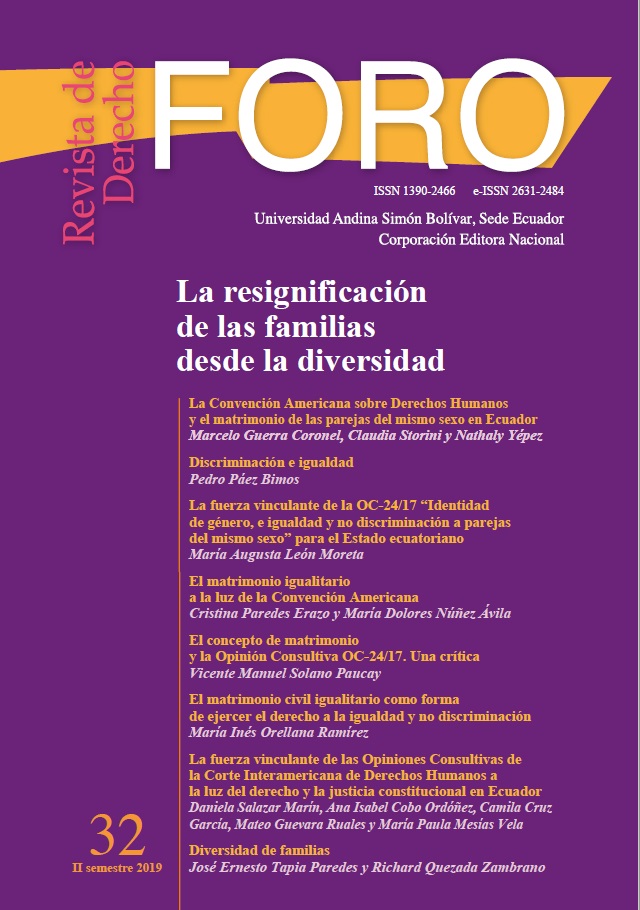Diversity of families: conformation, socioeconomic revolution and state juridical protection
DOI:
https://doi.org/10.32719/26312484.2019.32.8Keywords:
Diversity of families, monogamy, monolove, polygamy, polylove, affectivity and femininity, pansexualityAbstract
This work focuses on the diversity of families that can start from physical attraction, or from necessity, or from affection, defying even the reductionist and isolating parameters of the monogamy and the monolove.
The content of the article without the intention of deplete the great diversity of families that can be formed, presents several family structures from an approximation of the circumstances of particular origin of each one and includes those families whose consolidation could well move towards elements of broad social integration.
Subsequently, the document refers to several circumstances of repression in which affection and femininity have been historical victims and whose effects are not only observed in the field intrafamily if not social. Likewise, the text is concerned with indicating why the conservative interest in maintaining the dominant reductionist monogamous family structure as the only protectable model it is advantageous and convenient for the private production system, contemplating the possibility of revolutionizing the economy at different levels based on the notion of family. Finally, this work makes a quick reference regarding the scope of the legal obligation
that the Ecuadorian State has regarding guaranteeing the achievement of the
purposes of the diversity of families that may be constituted.
Keywords: Diversity of families, monogamy, monolove, polygamy, polylove, pansexuality,
affectivity and femininity.
Downloads
References
Blanco L., O. Cedre, y M. E. Guerra. Factores determinantes del embarazo adolescente. Venezuela: Universidad Central de Venezuela, 2015.
Constitución de la República del Ecuador. 2008.
De los Ríos, Patricia. Los movimientos sociales de los años sesenta en Estados Unidos: un legado contradictorio. México: Universidad Autónoma Metropolitana, 1998.
Eroles Carlos, Angélico Héctor, y Alberto L. Bialakowsky. Familia(s), estallido, puente y diversidad: una mirada transdisciplinaria de derechos humanos. Buenos Aires: Espacio Editorial, 2006.
Fondo de las Naciones Unidas para la Infancia. Diez razones para poner fin legalmente al matrimonio infantil en República Dominicana. Santo Domingo: UNICEF, 2019.
Fong, Héctor, Dalila De la Cruz y Rocío López. Vidas robadas: repercusiones en la salud integral en las niñas menores de 14 años embarazadas. Guatemala: Observatorio de Salud Reproductiva, 2015.
García Daniel. Protesta y política: los movimientos antiguerra en Estados Unidos. Bogotá: Universidad de los Andes, 1988.
Gastiz, Victoria. Los hombres, la igualdad y las nuevas masculinidades. Araba: Instituto Vasco de la Mujer Emakunde, 2008.
Martínez William. “Matrimonios a la fuerza”. El Tiempo (Colombia). 5 de marzo de 2000.
Mazzei Claudia. Producción y reproducción: la mujer y la división socio-sexual del trabajo. Chile: Universidad Central de Chile RUMBOS, 2013.
Organización Mundial de la Salud. El embarazo en adolescentes. Washington: OMS, 2015.
––. The health andwell-being of men in theWHO European Region: better health througha gender approach. United Kingdom: OMS, 2018.
Pascual, Belén. Masculinidades: ¿por qué los hombres también necesitan feminismo? Castellón: Universidad de Jaume, 2015.
Polo, Sara. “Poliamor”. El Mundo. 12 de febrero de 2016.
Sandoval, Ana Elisa. La licuefacción de la sexualidad: una aproximación a la pansexualidad en la modernidad líquida. Quito: Pontificia Universidad Católica del Ecuador, 2016.
Tapia Paredes, José Ernesto. “Perspectivas para la protección normativa de los conocimientos tradicionales frente al régimen de propiedad intelectual en el comercio internacional”. Tesis de maestría, Universidad Andina Simón Bolívar, Sede Ecuador, 2014.
Downloads
Published
How to Cite
Issue
Section
License
CESIÓN DE DERECHOS, DECLARACIÓN DE CONFLICTO DE INTERESES Y DIFUSIÓN
Los autores/as que publiquen en esta revista aceptan las siguientes condiciones:
- Los autores ceden a la Foro: Revista de Derecho, el derecho de la primera publicación. Las obras se publican en la edición electrónica e impresa de la revista bajo una Licencia Creative Commons 4.0 de Reconocimiento No Comercial-Compartir Igual 4.0, que habilita a compartir, adaptar y atribuir el trabajo (ver: Políticas de acceso abierto).
- Ver información completa de cesión de derechos, declaración de conflicto de intereses y difusión, aquí







